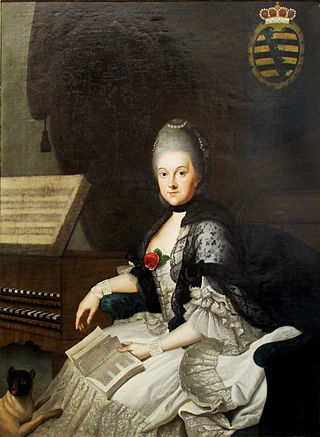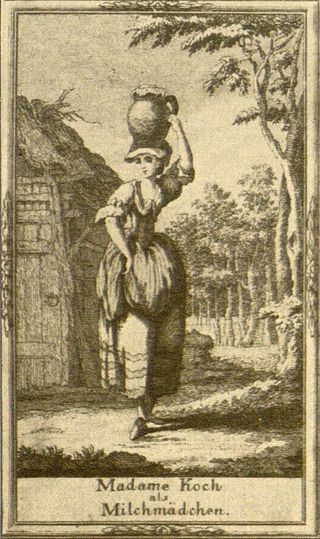Project Gutenberg (PG) is a volunteer effort to digitize and archive cultural works, as well as to "encourage the creation and distribution of eBooks." It was founded in 1971 by American writer Michael S. Hart and is the oldest digital library. Most of the items in its collection are the full texts of books or individual stories in the public domain. All files can be accessed for free under an open format layout, available on almost any computer. As of 3 October 2015, Project Gutenberg had reached 50,000 items in its collection of free eBooks.

Weimar is a city in the state of Thuringia, Germany. It is located in Central Germany between Erfurt in the west and Jena in the east, approximately 80 km (50 mi) southwest of Leipzig, 170 km (106 mi) north of Nuremberg and 170 km (106 mi) west of Dresden. Together with the neighbouring cities of Erfurt and Jena, it forms the central metropolitan area of Thuringia, with approximately 500,000 inhabitants. The city itself has a population of 65,000. Weimar is well-known because of its large cultural heritage and its importance in German history.

Wolfenbüttel is a town in Lower Saxony, Germany, the administrative capital of Wolfenbüttel District. It is best known as the location of the internationally renowned Herzog August Library and for having the largest concentration of timber-framed buildings in Germany. It is an episcopal see of the Evangelical Lutheran Church in Brunswick. It is also home to the Jägermeister distillery, houses a campus of the Ostfalia University of Applied Sciences, and the Landesmusikakademie of Lower Saxony.

The Gutenberg Bible was the earliest major book printed in Europe using mass-produced metal movable type. It marked the start of the "Gutenberg Revolution" and the age of printed books in the West. The book is valued and revered for its high aesthetic and artistic qualities as well as its historical significance. It is an edition of the Latin Vulgate printed in the 1450s by Johannes Gutenberg in Mainz, in present-day Germany. Forty-nine copies have survived. They are thought to be among the world's most valuable books, although no complete copy has been sold since 1978. In March 1455, the future Pope Pius II wrote that he had seen pages from the Gutenberg Bible displayed in Frankfurt to promote the edition, and that either 158 or 180 copies had been printed.
Anna Amalia or Anna Amalie may refer to:

Princess Anna Amalia of Prussia was an early modern German composer and music curator who served as princess-abbess of Quedlinburg. She was a princess of Prussia as the daughter of Frederick William I of Prussia and the sister of Frederick the Great.

Anna Amalia of Brunswick-Wolfenbüttel, was a German princess and composer. She became the duchess of Saxe-Weimar-Eisenach by marriage, and was also regent of the states of Saxe-Weimar and Saxe-Eisenach from 1758 to 1775. She transformed her court and its surrounding into the most influential cultural center of Germany.

The Duchess Anna Amalia Library in Weimar, Germany, houses a major collection of German literature and historical documents. In 1991, the tricentennial of its opening to the public, the Ducal Library was renamed for Duchess Anna Amalia. Today, the library is a public research library for literature and art history. The main focus is German literature from the Classical and the late Romantic eras. The library was inscribed on the UNESCO World Heritage List as part of the Classical Weimar site because of its testimony to the global cultural importance of Weimar during the late 18th and early 19th centuries during the Weimar Classicism movement.

Erwin und Elmire is an opera in two acts by Duchess Anna Amalia of Brunswick-Wolfenbüttel, with a libretto by Johann Wolfgang von Goethe, after Oliver Goldsmith's ballad of Angelica and Edwin, The Hermit, in his sentimental novel The Vicar of Wakefield.
Wilhelm Fröhner or Guillaume Frœhner was a curator at the Musée du Louvre, an archaeological researcher and collector of antiquities in Paris. As a historian, he publicly rejected Gustave Flaubert's depiction of infanticide in Punic culture, described in Salammbô.

Classical Weimar is a UNESCO World Heritage Site consisting of 11 sites located in and around the city of Weimar, Germany. The site was inscribed on 2 December 1998. The properties all bear testimony to the influence of Weimar as a cultural centre of the Enlightenment during the eighteenth and early nineteenth centuries. A number of notable writers and philosophers lived in Weimar between 1772 and 1805, including Johann Wolfgang von Goethe, Johann Gottfried Herder, Friedrich Schiller, and Christoph Martin Wieland. These figures ushered in and participated in the Weimar Classicism movement, and the architecture of the sites across the city reflects the rapid cultural development of the Classical Weimar era.

Amalia of Saxony was a princess of Saxony and by marriage Duchess of Bavaria-Landshut.

Anna Rosina de Gasc was a German portrait painter.

Alceste is an opera in German in five acts by Anton Schweitzer with a libretto by Christoph Martin Wieland. It was commissioned by Abel Seyler for the Seylersche Schauspiel-Gesellschaft, and premiered on 28 May 1773 at the Hoftheater Weimar. Considered a milestone of German opera, it was revived in Weimar and recorded in 1999.
Michael Maul is a German musicologist noted for his work on Johann Sebastian Bach. Maul was born in Leipzig, and is still based in the city, although his work at the Bach Archive has involved travel to archives and libraries across Germany in search of new sources relating to Bach. He is also artistic director of Leipzig's annual Bach festival.

Henri Friedlaender (1904–1996) was an Israeli typographer and book designer. He co-founded the Hadassah Printing School and served as the first director of the school.

Franziska Romana Koch, née Gieraneck, Giwraneck, Giraneck, Jiránek (1748–1796) was a German ballet dancer, soprano, and actress. First a dancer as the member of the theatre company Kochische Gesellschaft, she also trained her voice and worked at the court theatre of Weimar. Anton Schweitzer composed the opera Alceste for her, and its librettist Christoph Martin Wieland celebrated her performance in the title role in a poem. She later worked in Gotha, and finally in Leipzig as a member of Bondini's company, where she retired in 1787.

The Weimar courtyard of the muses is a term, that had emerged during the 19th century. It refers to an elite fellowship of people in Classical Weimar (1772-1805), that was made up of nobles and commoners, courtiers, civil servants, writers, artists and scientists, who congregated around the central character, Duchess Anna Amalia of Saxe-Weimar-Eisenach, pioneer of Weimar Classicism and patroness of the arts. Duchess Anna Amalia was the mother and from 1758 until 1775 regent for the infant Grand Duke Karl August von Sachsen-Weimar-Eisenach. Among the poets living in Weimar were the most famous German authors of their time, Johann Wolfgang von Goethe, Friedrich Schiller, Christoph Martin Wieland and Johann Gottfried Herder.

Martin Gottlieb Klauer was a German sculptor, and one of the first teachers at the Weimar Princely Free Drawing School.
Hellmut Otto Emil Lehman-Haupt was a German-American author, academic, bibliography expert, and rare books expert. After World War II, he worked with the Monuments, Fine Arts, and Archives program, commonly known as the Monuments Men.














